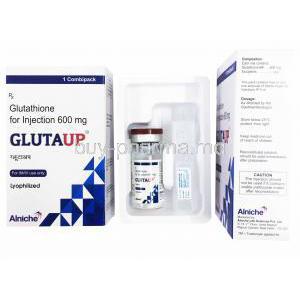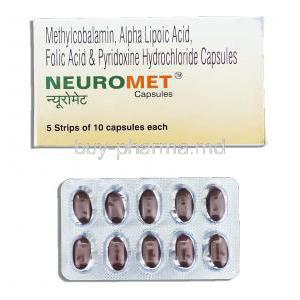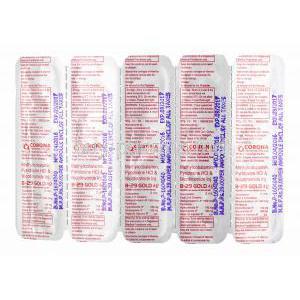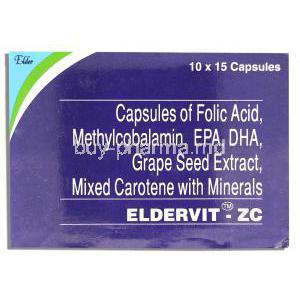Methylcobalamin Injection
- Introduction to Methylcobalamin Injection
- Uses of Methylcobalamin Injection
- Off-Label Uses of Methylcobalamin Injection
- How Methylcobalamin Injection Works
- Dosage and Administration of Methylcobalamin Injection
- Composition of Methylcobalamin Injection
- Side Effects of Methylcobalamin Injection
- Warnings and Precautions with Methylcobalamin Injection
- Contraindications of Methylcobalamin Injection
- Important Considerations for Specific Populations
- Interactions with Methylcobalamin Injection
- Storage and Handling of Methylcobalamin Injection
- Overdose of Methylcobalamin Injection
- Careful Administration of Methylcobalamin Injection
Introduction to Methylcobalamin Injection
Overview of Methylcobalamin
Vitamin B12, in the form of Methylcobalamin, is essential for keeping the system healthy and aiding the body's metabolism. It differs from cyanocobalamin as it occurs naturally and is easily absorbed by the body, making it a popular option in therapies.
Importance of Vitamin B12 in the Body
Adequate levels of vitamin B12 are essential for creating DNA and forming blood cells, as well as maintaining the protective myelin covering around nerves in the body. Inadequate B12 levels may result in problems such as peripheral neuropathy and memory-related difficulties, leading to cognitive decline. Maintaining levels of Vitamin B12 is crucial for promoting blood cell production and optimal nerve functionality.
Methylcobalamin vs. Other Forms of Vitamin B12
Cyanocobalamin is often prescribed as a form of B12 supplementation; however, it needs to be converted to methylcobalamin in the body for utilization purposes. Methylcobalamin stands out as it can be readily used in metabolic functions without needing conversion, making it an efficient option for addressing issues such as cognitive impairment.
Brief History and Development of Methylcobalamin Injection
The practical use of methylcobalamin started in the middle of the century as its better absorption became more acknowledged over time. Studies have broadened its applications, from treating B12 deficiency to investigating its advantages in neurology, immunology, and metabolic conditions.
Uses of Methylcobalamin Injection
Treatment of Vitamin B12 Deficiency
Doctors often prescribe methylcobalamin to treat Vitamin B12 deficiency, which can cause anemia, fatigue, and other symptoms of the condition. It is especially beneficial for individuals, with malabsorption problems or those who struggle to absorb types of Vitamin B12 supplements.
Neuropathy and Neurological Disorders
Neuropathy cases often benefit from methylcobalamin to aid nerve repair by boosting myelin production. It is commonly utilized for treating neuropathies triggered by conditions such as diabetes and chemotherapy that lead to nerve degeneration.
Use in Pernicious Anemia
A known condition called anemia often requires methylcobalamin injections to address B12 deficiency, which is caused by an autoimmune issue hindering B12 absorption in the body.
Supporting Cognitive Function and Memory
The neuroprotective effects of Methylcobalamin are beneficial for improving function and warding off memory decline in the population. It aids in promoting neurotransmitter function and lowering the chances of dementia and cognitive issues associated with aging.
Methylcobalamin in Peripheral Neuropathy
Methylcobalamine is known to aid in the regeneration of nerves and alleviation of symptoms in cases such as diabetic neuropathy, where patients often report decreased numbness and tingling sensations along with pain relief.
Methylcobalamin for Diabetes-Related Nerve Damage
Diabetic neuropathy poses a challenge for individuals with diabetes. Methylcobalamin injections play a role in repairing nerve damage by alleviating pain and enhancing nerve functionality in areas like the extremities.
Off-Label Uses of Methylcobalamin Injection
Support for Chronic Fatigue Syndrome
Methylcobalamin, a medication not typically prescribed for fatigue syndrome (also known as CFS), has been utilized to address tiredness and boost vitality levels in individuals with this ailment due to its impact on generating energy. Thus, it offers a possible treatment avenue for this difficult condition.
Possible Benefits in Multiple Sclerosis
Preliminary research suggests methylcobalamin could be beneficial in treating multiple sclerosis (MS), a degenerative autoimmune disease. Its neuroprotective properties may help slow down the progression of nerve damage.
Usage in Chronic Pain Management
Exploring the use of methylcobalamin as a treatment for pain management has shown potential benefits for conditions associated with nerve pain. By aiding in the regeneration of damaged nerves, methylcobalamin offers a hopeful solution for alleviating pain.
Potential in Autism Spectrum Disorder
Certain research suggests that methylcobalamin could potentially aid in enhancing behavioral aspects in children diagnosed with autism spectrum disorder (AS). The belief is that it may improve function and decrease stress levels.
Methylcobalamin in the Treatment of Sleep Disorders
Research has shown that Methylcobalamin can impact melatonin production and may be beneficial, in treating sleep disorders in individuals, with sleep patterns.
How Methylcobalamin Injection Works
Mechanism of Action in the Body
The function of methylcobalamin involves providing methyl groups for biological functions such as DNA production, cell renewal, and nerve activity support.

Role in Nerve Regeneration
The injection helps damaged nerves heal by boosting the production of acids and aiding in the repair of the protective myelin sheath essential for those with neuropathies.
Impact on DNA Synthesis and Red Blood Cell Formation
Vitamin B12 plays a role in creating blood cells by aiding in DNA synthesis and promoting healthy cell division. This helps ward off megaloblastic anemia caused by B12 deficiency.
Methylcobalamin vs. Cyanocobalamin: Key Differences
Methylcobalamin differs from cyanocobalamin by skipping the need for liver conversion and being readily available for cell use away.This quick absorption leads to longer-lasting benefits,namely in the treatment of neurological conditions.
Dosage and Administration of Methylcobalamin Injection
Standard Dosage for Adults
Adults usually receive between 500 and 1000 micrograms through an injection into the muscle or under the skin, with the method of administration based on the seriousness of the deficiency and the specific medical issue at hand.
Adjusting Dosage Based on Medical Condition
People with B12 deficiency or ongoing issues, like neuropathy, might need increased or frequent doses of medication as healthcare providers typically adjust doses according to each person's reaction and recovery journey.
Administration Techniques for Optimal Absorption
To ensure the absorption of methylcobalamin, it is given through an injection into the muscle or under the skin rather than going through the digestive system. This method allows for availability in the body, which is important for treating serious deficiencies or neurological issues.
Frequency of Injections and Duration of Therapy
The length of treatment can differ; however, injections may be administered biweekly until vitamin B12 levels return to normalcy. To avoid a relapse of the deficiency, ongoing maintenance therapy usually includes injections.
Dosage Adjustments for Special Populations
Patients who are older, have kidney or liver issues, or have certain neurological disorders might need changes in their medication dosage amounts. It is important to keep track of the levels of vitamin B12 in the blood to make sure that the treatment is adjusted properly.
Composition of Methylcobalamin Injection
Active Ingredients in Methylcobalamin Injection
Each shot includes methylcobalamin as a component. Depending on the product, it is usually found in strengths of 500 mugs or 1000 mugs per administration.

Inactive Ingredients and Their Role
The solution for injection includes stabilizers and preservatives along with saline to maintain the product's stability and sterility and ensure safety during administration.
Available Strengths and Concentrations
To cater to patient requirements, methylcobalamin injections are offered in a range of strengths, including 500 mcgL and 1000 mcgL.
Methylcobalamin vs cyanocobalamin
Synthetic cyanocobalamin and natural methylcobalamin serve purposes in the body; however the body has the ability to transform forms into natural ones as needed.The essential water soluble vitamin B12 (also called cobalamin) plays a role, in producing blood cells maintaining brain health and facilitating DNA synthesis.
Methylcobalamin vs methylfolate
In the realm of vitamins, methyl folate stands out as the version of vitamin B9 that plays a role in supporting brain health and cellular development by effectively piercing the blood-brain barrier. Methylcobalamin complements methyl folate by assisting in nerve function and collaborating to lower the likelihood of issues as a form of vitamin B12.
Adenosylcobalamin vs methylcobalamin
Adenosylcobalamin is primarily involved in energy production and metabolism, within the mitochondria of cells; whereas methylcobalamin plays a role, in regulating levels to support overall health.
Methylcobalamin alpha lipoic acid
They are part of a category known as " supplements," which address deficiencies in vitamins and minerals vital for our body functions. Vitamins and minerals are crucial for maintaining health in our bodies. Not getting an adequate amount of these nutrients can result in issues like disorders, bone irregularities, and blood clotting complications.
Side Effects of Methylcobalamin Injection
Overview of Potential Side Effects
Generally speaking, methylcobalamin is well received among patients; however, some individuals might encounter a range of side effects, varying from mild to severe. It is crucial to comprehend these reactions for treatment and care.
Common Side Effects
Typical side effects may consist of discomfort at the injection spot, along, with headaches or dizziness and some stomach uneasiness; however these symptoms typically fade away after a short period.
Rare but Serious Side Effects
In some instances, individuals might encounter reactions like symptoms (e.g., skin rashes or swelling) or heart-related issues. It's crucial to seek assistance when faced with such situations.

Managing Side Effects: What to Expect
Usually, mild side effects tend to go on their own; however, if the symptoms persist, adjustments in dosage or trying out different treatments might be needed. It's important to inform your healthcare provider about any reactions experienced.
Warnings and Precautions with Methylcobalamin Injection
Important Warnings to Be Aware Of
For health safety reasons, individuals who have a documented allergy to cobalamin or its elements should refrain from receiving methylcobalamin injections. It is recommended that individuals with nerve impairment or Leber's disease avoid using this form of vitamin B12 supplementation.
Risk of Allergic Reactions
While rare, allergic reactions to methylcobalamin can occur. Symptoms such as itching, swelling, or difficulty breathing should be treated as a medical emergency.
Careful Administration in Patients with Liver or Kidney Issues
Patients who have issues with their liver or kidney functions should only use methylcobalamin injections under monitoring by a healthcare professional. May need to adjust the dosage to prevent any negative reactions.
Risk of Hypokalemia (Low Potassium)
Treatment with methylcobalamin can result in a boost in blood cell production in people with severe B12 deficiency and may potentially trigger hypokalemia; hence, it is recommended to keep an eye on potassium levels.
Use in Individuals with Leberâs Disease
People with Leber's neuropathy, should avoid receiving Methylcobalamin injections because it may worsen the degeneration of the optic nerve and result in permanent vision loss.
Methylcobalamin cyanide poisoning
Methylcobalamin has a methyl group, while cyanocobalamin includes a cyanide molecule in its composition.Cyanocobalamin is a version of vitamin B12 that is not naturally occurring and is commonly used in supplements due to its perceived stability and cost efficiency compared to other forms of vitamin B12.
Contraindications of Methylcobalamin Injection
Medical Conditions That Prohibit Use
Some health conditions may not be suitable for receiving methylcobalamin injections due to the risks involved and potential complications that could arise in individuals with kidney problems or a specific genetic disorder known as Leber's hereditary optic neuropathy. In these instances the drawbacks of treatment may outweigh the advantages by worsening symptoms or furthering the condition's progression. Furthermore, individuals who have a sensitivity to cobalt-based substances should be careful when considering methylcobalamin as it could lead to reactions.
Allergies to Methylcobalamin or Other Components
Allergies to methylcobalamin are uncommon but possible. They may lead to symptoms such as rashes or swelling and can even cause breathing difficulties or severe reactions like anaphylaxis in some cases. It's important for healthcare professionals to check a patient's allergy background before giving the injection to prevent any reactions to methylcobalamin or any of the other components in the shot.
Interactions with Other Medications or Supplements
Taking Methylcobalamin injections may impact medications by either lowering their effectiveness or triggering reactions. For instance, drugs like chloramphenicol prescribed for infections might weaken the body's response to Methylcobalamin. It is important for patients to communicate openly with their healthcare providers about the supplements and medications they are using to prevent any drug interactions.
Important Considerations for Specific Populations
Administration to Elderly Patients
When giving methylcobalamin injections to individuals, it's important to be cautious because aging can bring about changes that impact the body's functioning over time. Older people might experience decreased liver and kidney function, which could influence how their bodies process and eliminate methylcobalamin. It's advisable to check both their vitamin B12 levels and kidney function to guarantee a successful treatment process.
Administration During Pregnancy and Lactation
During pregnancy and breastfeeding, it is generally considered safe for women to receive injections of Methylcobalamin since Vitamin B12 plays a role in the health of both the mother and the baby's development in the womb. However, extra care should be taken during the three months of pregnancy. It's advisable for expecting mothers to discuss with their healthcare provider to decide the amount and frequency of Methylcobalamin intake. While breastfeeding, it's essential for mothers to maintain levels of Methylcobalamin to ensure that enough Vitamin B12 is passed onto their babies through breast milk.
Safe Use in Children and Adolescents
When it comes to using methylcobalamin injections in children and teenagers, it's important to adjust the dosage according to their age and weight, as well as the seriousness of their vitamin B12 deficiency. Pediatric patients who have inherited metabolic disorders or conditions that hinder the absorption of vitamin B12 could see improvements with this treatment.Close monitoring is crucial to prevent any side effects and ensure the correct dosage is administered.

Interactions with Methylcobalamin Injection
Drug-Drug Interactions
Some medications may affect how well methylcobalamin injections work by either boosting or diminishing their benefits to the body's health and functionality. For instance, drugs, like proton pump inhibitors (PPIs) and H2 receptor antagonists, which are often prescribed for reflux treatment, can lessen the stomach's ability to produce acid. This can hinder the absorption of vitamin B12. Similarly, metformin, a drug used in managing diabetes, can also disrupt the absorption of B12. As a result, higher doses of methylcobalamin may be needed to counteract this interference.
Impact on Laboratory Test Results
When individuals receive methylcobalamin injections, changes in laboratory test outcomes such as serum B12 levels and homocysteine measurements may occur, which can impact the understanding of test results and possibly result in misdiagnosis or improper treatment adjustments by healthcare professionals analyzing lab work of patients undergoing methylcobalamin therapy.
Food and Supplement Interactions
Certain dietary elements and supplements could impact how well methylcobalamin injections are absorbed and work in the body. Folic acid, for example, could hide the signs of a lack of vitamin B12 and slow down proper diagnosis and treatment. It's recommended to steer clear of large amounts of folic acid without guidance from a healthcare provider while receiving methylcobalamin treatment.
Storage and Handling of Methylcobalamin Injection
Recommended Storage Conditions
Store methylcobalamin injections, in a place where the room temperature is controlled within the range of 15°C to 25°C (59°F to 77°F). Avoid exposing them to heat or freezing temperatures as it may affect the quality of the medication and reduce its efficacy.
Shelf Life and Expiry Considerations
The expiration period of methylcobalamin injections typically ranges from 12 to 24 months and may vary among manufacturers; therefore, it is crucial to verify the expiry date prior to utilization to prevent any potential loss of effectiveness or safety risks associated with expired products. It is also essential to properly dispose of expired injections to prevent inadvertent administration.
Handling Precautions for Healthcare Providers
Healthcare professionals must ensure they take the required precautions when administering methylcobalamin injections to uphold cleanliness and prevent contamination risks. They must utilize tools and adhere to proper storage practices and the manufacturer's recommended protocols for preparation and delivery.
Overdose of Methylcobalamin Injection
Symptoms of Overdose
In some cases, when much methylcobalamin is taken, it can cause symptoms like feeling lightheadedness or having a headache, or feeling nauseous, and, in some situations, even anaphylaxis could occur as a result of an overdose of methylcobalamin Too much methylcobalamin could also make certain existing medical conditions worse such, as kidney problems or heart issues.
Treatment and Management of Overdose
If you suspect an overdose of methylcobalamin has occurred, seek help. The usual treatment involves stopping the injection and giving supportive care. In instances of severe allergic reactions or anaphylaxis, administering epinephrine and antihistamines may be needed.
Long-Term Effects of Excessive Doses
Continuous use of large amounts of methylcobalamin over a period can lead to issues like kidney stress and nerve damage while causing imbalances in important vitamins and minerals in the body. Therefore, it is crucial to monitor and adjust the dosage to avoid any long-lasting negative impacts.
Careful Administration of Methylcobalamin Injection
Special Considerations for Patients with Preexisting Conditions
Patients who have existing health issues, like kidney problems or heart conditions, need to be watched when they get methylcobalamin injections. They should receive a treatment plan that fits their background to make sure the therapy doesn't make their condition worse.
Monitoring Patients for Adverse Reactions
It's important to monitor patients who are getting methylcobalamin injections to catch any reactions or issues early on. This involves performing blood tests to check their vitamin B12 levels and kidney and liver function, as well as watching out for any signs of allergies or unwanted side effects.
Guidelines for Adjusting Dosage Based on Tolerance
Adjustments, to the dosage might be needed depending on how the patient can handle the injections effects.If any side effects show up cutting back on the dosage or spacing out the injections can ease symptoms.Healthcare professionals must evaluate how patients react and modify their treatment plans as needed for the results.
Methylcobalamin Injection FAQ
- How is methylcobalamin made?
- What is methylcobalamin made from?
- What is the difference between methylcobalamin and cyanocobalamin?
- Which b12 is better methylcobalamin or cyanocobalamin?
- Why is methylcobalamin better than cyanocobalamin?
- What is the difference between vitamin b12 and methylcobalamin??
- What is methylcobalamin good for?
- How much methylcobalamin per day?
- How much methylcobalamin b12 should I take?
How is methylcobalamin made?
In the lab, scientists can create methylcobalamin by using sodium borohydride to reduce cyanocobalamin in an alkaline solution and then adding methyl iodide.
What is methylcobalamin made from?
One way to create methylcobalamin in a lab is to use sodium borohydride to reduce cyanocobalamin in an alkaline solution and then add methyl iodide.
What is the difference between methylcobalamin and cyanocobalamin?
Methylcobalamin has a methyl group, while cyanocobalamin includes a cyanide molecule. Cyanocobalamin is a version of vitamin B12 that does not occur naturally; it is often used in supplements due to its perceived stability and cost efficiency compared to other types of vitamin B12.
Which b12 is better methylcobalamin or cyanocobalamin?
Research has indicated that methylcobalamin offers health advantages that cyanocobalamin lacks. For instance methylcobalamin can enhance nerve function and reduce neuropathy symptoms whereas cyanocobalamin has not shown a substantial effect, on nerve function.
Why is methylcobalamin better than cyanocobalamin?
Cyanocobalamin might be easily absorbed by the body compared to methylcobalamin, which tends to have a higher rate of retention.
What is the difference between vitamin b12 and methylcobalamin??
You'll probably encounter two types of vitamin B12--Methylcobalamin and cyanocobalamin. The vitamin B12 used for supplements is cyanocobalamin, which is manufactured chemically. Methylcobalamin, which is naturally present in animal-based foods, constitutes the other form that we are discussing here
What is methylcobalamin good for?
It is recommended that individuals experiencing a lack of vitamin B12 consider using methylcobalamin, as this vitamin plays a role in supporting brain and nerve function and red blood cell production by aiding in the formation of "myelin."
How much methylcobalamin per day?
To ensure the supplement's absorption and bioavailability, it is advisable to take 500 micrograms three times a day, for a total of 1500 micrograms of either methylcobalamin or 5' adenosylcobalamin. Many common vitamin supplements often include cyanocobalamin, which may not be as efficient or beneficial.
How much methylcobalamin b12 should I take?
2.4 mcg




















